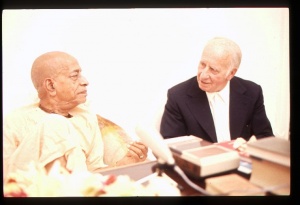BG 10.37 (1972)

A.C. Bhaktivedanta Swami Prabhupada
TEXT 37
- वृष्णीनां वासुदेवोऽस्मि पाण्डवानां धनञ्जयः ।
- मुनीनामप्यहं व्यासः कवीनामुशना कविः ॥३७॥
- vṛṣṇīnāṁ vāsudevo 'smi
- pāṇḍavānāṁ dhanañjayaḥ
- munīnām apy ahaṁ vyāsaḥ
- kavīnām uśanā kaviḥ
SYNONYMS
vṛṣṇīnām—of the descendants of Vṛṣṇi; vāsudevaḥ—Kṛṣṇa in Dvāraka; asmi—I am; pāṇḍavānām—of the Pāṇḍavas; dhanañjayaḥ—Arjuna; munīnām—of the sages; api—also; aham—I am; vyāsaḥ—Vyāsa, the compiler of all Vedic literature; kavīnām—of all great thinkers; uśanā—Uśanā; kaviḥ—the thinker.
TRANSLATION
Of the descendants of Vṛṣṇi I am Vāsudeva, and of the Pāṇḍavas I am Arjuna. Of the sages I am Vyāsa, and among great thinkers I am Uśanā.
PURPORT
Kṛṣṇa is the original Supreme Personality of Godhead, and Vāsudeva is the immediate expansion of Kṛṣṇa. Both Lord Kṛṣṇa and Baladeva appear as the sons of Vasudeva. Amongst the sons of Pāṇḍu, Arjuna is famous and valiant. Indeed, he is the best of men and therefore represents Kṛṣṇa. Among the munis, or learned men conversant in Vedic knowledge, Vyāsa is the greatest because he explained Vedic knowledge in many different ways for the understanding of the common mass of people in this age of Kali. And Vyāsa is also known as an incarnation of Kṛṣṇa; therefore Vyāsa also represents Kṛṣṇa. Kavis are those who are capable of thinking thoroughly on any subject matter. Among the kavis, Uśanā was the spiritual master of the demons; he was extremely intelligent, far-seeing, political and spiritual in every way. Thus Uśanā is another representative of the opulence of Kṛṣṇa.